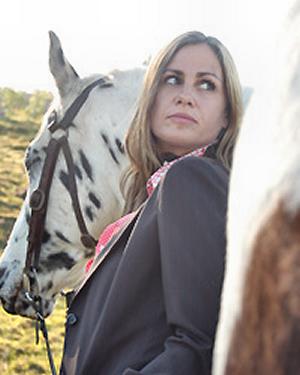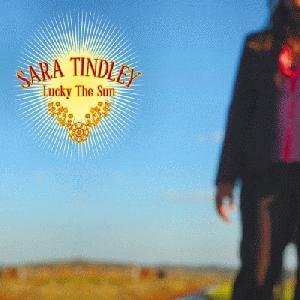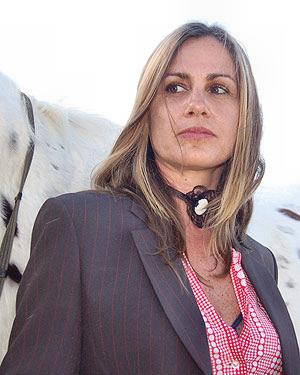DAVE'S DIARY - 29 AUGUST 2007 - SARA TINDLEY CD REVIEW
SARA
TINDLEY - HOMETOWN RIDE
"Might be hanging around/ might be sitting on the courthouse steps/
drinking at the Commercial/ climb through barbed wire fences/ let down
your defences/ and come on back to me." - Paulie's Last Ride -
Sara Tindley.
 |
Sara
Tindley lives in beachside bliss outside Ballina but it's her Victorian
hometown Camperdown that dominates her homage to her past on her second
album Lucky The Sun (Vitamin.) Tindley paints a salient snapshot of her return to her rural roots in the credible charm of Paulie's Last Ride, now accompanied by a video clip. The journey could be interpreted in real time or as a metaphorical trip down that route to withdraw creative collateral from her memory bank. The mother of a 10-year-old daughter sets her evocative tale against the backdrop of the Commercial Hotel - largest of three pubs in the historic Western Victorian sheep and dairying town on Highway 1. |
Her other
local landmark - the 1886 courthouse - is now the tourist info HQ and
arts and crafts centre.
But the memories of the song's central character Paulie and ravages of
time on his life and psyche add an extra dimension.
The character, reputedly trapped in narrow constraints of his environs
that lead to his subsequent substance abuse, is the focus of a personalised
social comment parable.
"Country around here has faded/ the land has given up the ghost/
I imagine I can still see the traces/ of the people who loved this place
the most."
Tindley's tale, dripping with nostalgia, also features a wry comment on
her current financial circumstances in the tiny town of Meershaum Vale
on the NSW north coast.
It echoes the scene of the rhyme with the common caveat - "like to
tell them that I've made it/ that my life's been one big success/ but
I'm still singing for my supper/ the government's making up the rest."
DOMESTIC VIOLENCE
"The woman saw a hard man/ believing she could make him change/ he beat her with no bruising/ stripped her bare to raw hot shame." - Heart It Was A Desert - Sara Tindley.
 |
Producer
Bill Chambers is perfect studio guide - but his success is not as
belated as his client. Tindley's journey reeks with regret tinged tales such as wanderlust fuelled Rambling Ways and her collaboration with pianist Will Grahame on the superb imagery of Rain Falls (with duet partner Troy Loakes.) The singer's character in the latter, benefiting from the wisdom of the missing years, chances her heart on a final lunge at love, unencumbered by the fools' gold of money and pretence. Her optimism is requited with "a late blooming girl has a place in the world." |
But hopefully
the character doesn't meet her demise in song sequencing and climate change
when Heart It Was A Desert - chronicling the fate of a battered
belle - follows Rain Falls.
The song's two characters embark on a dangerous dalliance, driven by dark
desires, as they head south on a train.
The feisty female believes she can tame her petulant protagonist but those
dreams are derailed by reality - "his heart was a desert/ no love
was going to grow there."
DIRT MUSIC DREAMS
"They were no childhood sweethearts/ they were no pretty young things/ their love was pure and dangerous/ sometime since they'd felt clean." - Dirt Music - Sara Tindley.
Tindley's
sequencing, aided by a vast contrast of desert imagery in Dirt Music,
leads to a more positive finale.
The two characters still dance on the high wire of danger but the female
finds solace in the song's rollicking redemption.
Tindley also uses an Elvis metaphor in Anchor Me where her character
faces danger but finds security of a protector in her wilderness.
That song's lyrics also highlight the album title Lucky The Sun.
Now back to the sequencing - is it intentional or subliminal serendipity?
The singer exudes unbridled passion in her riveting entrée Hot
For You and segues to the romantic abandonment of One And Only.
Then it's the uninhibited dropping of the heart's drawbridge in True
Believer - a song reprised as the hidden track after the equally joyous
finale Love Thing.
Yes, there is a concept album of a difference where art imitates life.
Tindley's musical journey echoes her latter day residential locale - two
decades later she still lives near Highway 1, albeit 1,000 miles north
of her source.
ROOTS COUNTRY
 |
So what
about the music? Well, debate ignited in Tamworth after a city critic described Tindley as alt country with an elitist sneer at the mainstream. Such vitriol is a bonus - it draws attention to a singer whose music is ignored by the corporate commercial chains that have long gelded radio. Tindley, like many peers, has an allure that will transcend narrow definitions of her art and music. Producer Chambers provides Tindley with the musical beds that ensure a pure roots country growth - reminiscent more of his protégé Catherine Britt than daughter Kasey who has chosen a pop path. |
Chambers
adds dobro, slide, lap steel and guitar supported by sensitive studio
serfs - guitarist James Gillard, bassist Jeff McCormack, drummer Mitch
Farmer and pianist and co-writer Will Grahame.
Tindley's success is not that belated - she toured the outback in 1993,
hit Byron Bay in 1994 and landed Staying In The Shack in Sea Change
in 1997.
And, with ABC and community radio exposure, she's ideal for CMC and Nu
Country TV.
Tindley also plans to follow more adventurous peers into the rural and
coastal dance halls and venues - not just suburban skull orchards.
"There's still an audience for me there," Tindley recently told
the Sydney Morning Herald.
"People who like country music in all its forms are really loyal,
they are just there for the music. They don't care whether you're pretty,
fat or skinny. If they like your songs, they'll come to your gigs."